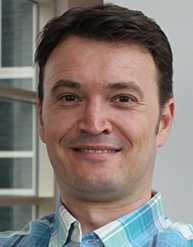CUOS Seminar | Optics Seminar
Noon Seminar Series: Four misconceptions about electron physics in plasmas
This event is free and open to the publicAdd to Google Calendar

Location: 1180 Duderstadt Center Presentation Room
ABOUT PROF. GOURDAIN:
Starting his career in magnetic confinement fusion at UCLA, Prof. Gourdain moved to Cornell University after his Ph.D. to study matter under extreme conditions on the Cornell Beam Research Accelerator. Prof. Gourdain is now an Associate Professor of Physics and Astronomy at the University of Rochester. He studied the stabilization of runaway confinement using fast ion pumping from ion cyclotron resonance, high beta confinement in tokamaks, the impact of Hall effect on high energy density plasma jets and he is working now on the transport properties of warm dense matter.
Research Overview
Extreme states of matter are most uncommon on Earth. However, they are quite common in the Universe and include all its visible matter, especially in the x-ray and gamma-ray ranges. As matter is pulled away from peaceful environments such as Earth or intergalactic space, it becomes stars, brown dwarves or even black holes. During this migration, it changes its physical properties. In turn these properties define the macroscopic scales of astrophysical systems and understanding universal mechanics requires knowing these properties. Prof. Gourdain is creating such extreme states in his laboratory to try to understand how high energy densities change the fundamental interactions of matter. His research group uses pulsed systems (principally lasers and pulsed-power generators) to:
- explore the fundamental laws of strongly interacting systems;
- study the formation of flows and shocks under extreme conditions;
- validate competing physical models by comparing numerical simulations to experimental measurements.
Pizza will be served
 MENU
MENU